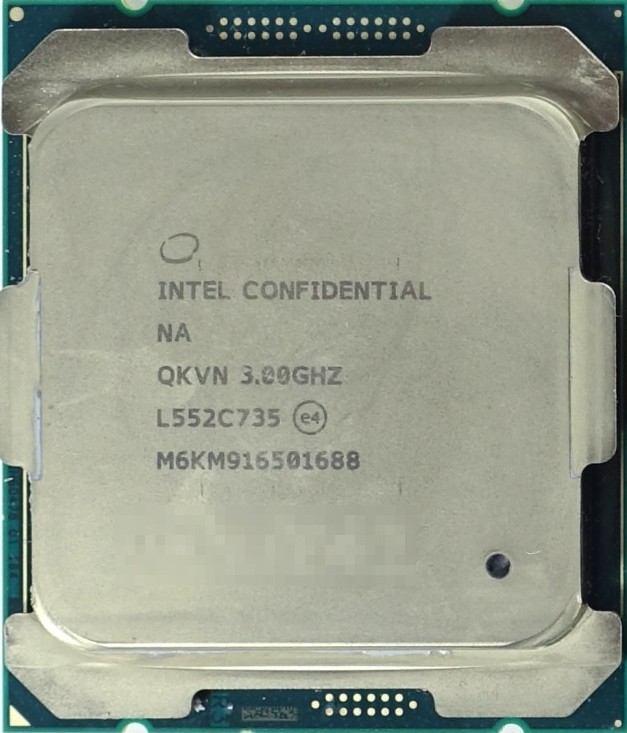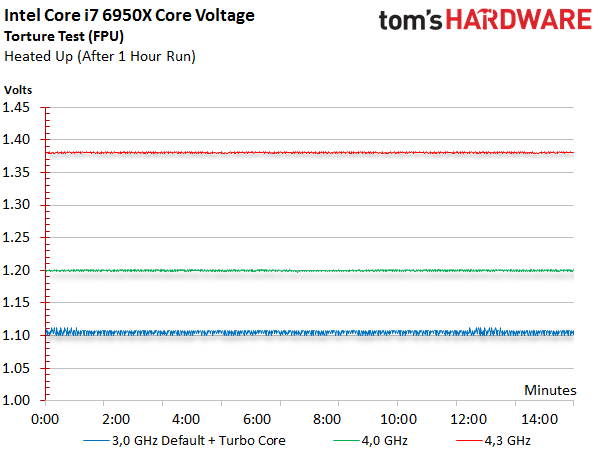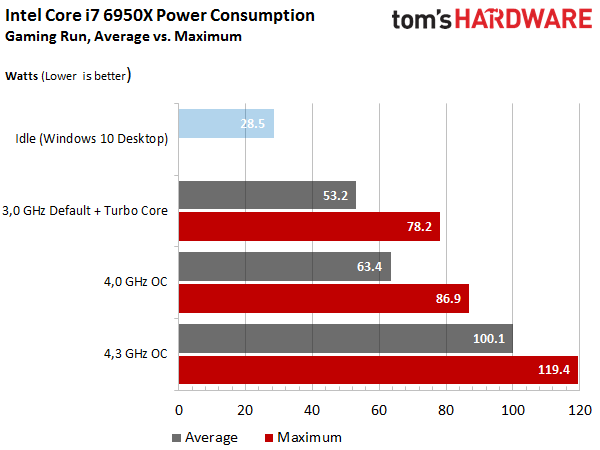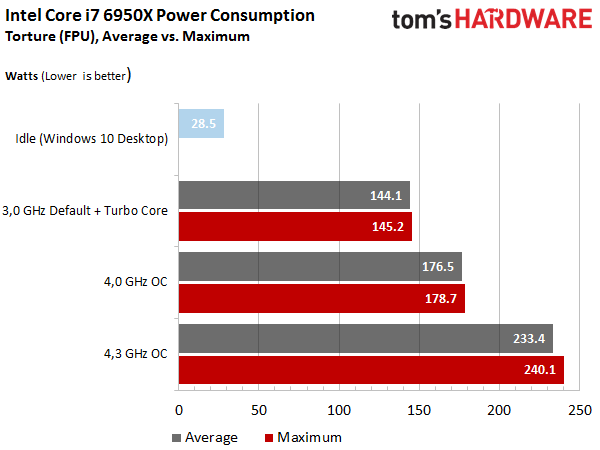Broadwell-E: Intel Core i7-6950X, 6900K, 6850K & 6800K Review
Is Broadwell more attractive to enthusiasts without graphics and up to 10 Hyper-Threaded cores? We test against two previous generations, plus Skylake to find out.
Intel Core i7-6950X: Overclocking, Power & Temperatures
Base Clock Frequency, Turbo Boost & Overclocking
The Core i7-6950X is Intel’s LGA 2011-v3-based flagship for enthusiasts. While its base clock rate is a paltry 3GHz, Turbo Boost takes it up to 3.5GHz in lightly threaded workloads. Consider the low floor necessary, since the -6950X wields 10 cores that pump out a lot of heat under full utilization.
In the gallery below, you're able to see how Intel's Turbo Boost adjusts the individual frequencies based on load changes.
Next, let’s take a look at the stress test clock rates for the three configurations we tested.
Core Voltage Necessary For A Stable Overclock
The maximum stable overclock of 4.3GHz is achieved with 1.38V. This is exactly what we saw from the Core i7-6900K. Predictably, the situation looks a bit better at 4.0GHz.
At this point, it really shouldn’t come as a surprise that each 100MHz is paid for dearly with a voltage increase. And once more, we hit a wall at 4.3GHz.
Resulting Power Consumption
Our numbers look good so long as the Core i7-6950X isn’t overclocked, but used according to Intel's stock specs. A maximum of 120W is quite reasonable, especially since games might not even push the CPU all the way there. However, our stress tests aren't as flattering.
At 4.3GHz using a 1.38V setting, and despite a great water-cooling solution, we're looking at a sky-high 240W result. Playing with AVX-optimized apps while keeping the processor from dropping its clock rate can get us all the way to 270W.
Get Tom's Hardware's best news and in-depth reviews, straight to your inbox.
Temperatures During Continuous Operation
At 240W, only the best cooling solutions can handle the Core i7-6950X. Because the area that needs to be cooled is small, the cores quickly get up to 90 degrees Celsius while the water is only at 34 degrees. The package doesn't do any better, which means that overclocking Intel's Core i7-6950X to this extent is a fool’s errand. We don't recommend going over 4.0 or 4.1GHz, depending on the quality of your sample. Anything higher turns the CPU into a space heater.
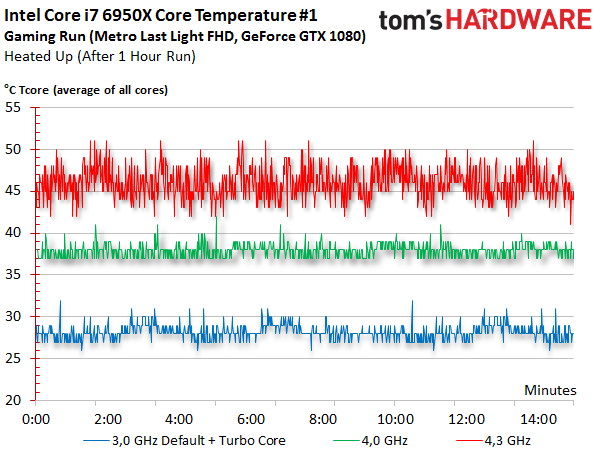
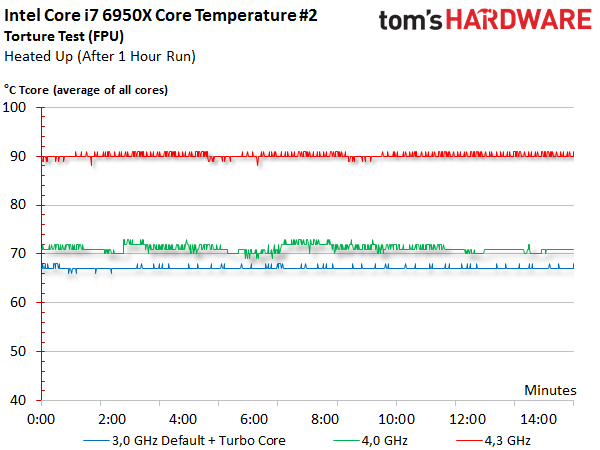
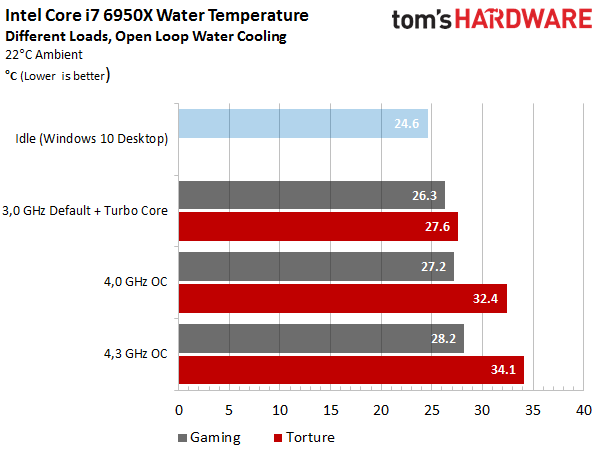
Bottom Line
We’ve thoroughly tested all four CPUs, and our conclusion lines up pretty well with what we found after benchmarking Intel's mainstream Broadwell processors last year: due to their architecture, they are reasonably efficient at stock settings. As soon as you start overclocking, power consumption goes through the roof and the small package gets extremely hot. In turn, it becomes hard to cool effectively. As if that wasn’t bad enough, there’s not much room for overclocking.
All told, the Core i7-6950X is no gamer’s CPU. Then again, it wasn't meant to be. The $1700+ price tag indicates its target market: professionals who need lots of cores and high clock rates, but only on a 1S platform. We imagine the Core i7-6950X could be fantastic in the right environment. But most enthusiasts are probably going to end up looking elsewhere.
MORE: Best CPUs
MORE: All CPU Content
MORE: Intel & AMD Processor Hierarchy
Current page: Intel Core i7-6950X: Overclocking, Power & Temperatures
Prev Page Intel Core i7-6900K: Overclocking, Power & Temperatures Next Page Intel Broadwell-E Conclusion-
jt AJ was expecting a bit more info and review usage of turbo 3.0. also looks like most of broadwell E chip is junk.. except that one 6850k chip you received probably lucky 1.25v for 4.4v would be good thats only because its broadwell. got one here for 4.8ghz at just 1.22v.Reply -
Nuckles_56 Chris, how likely is it that a noctua NH-D15 would be able to cool these heat producing monsters if your h100i struggled and failed with the i7-6800k @4.4GHz.Reply
But a truly excellent review, even if it does show that there is little reason to go to broadwell-E over Haswell-E -
elho_cid I'd love to step up to the realm of higher core count, but given the results of Adobe SW when scaling to many threads, meas it is not really useful right now. :/Reply
That's a pity, because the most time I spend staring at a progress bar is when I'm using Adobe products. I don't really need more power to "background tasks" like zipping or lame encoding.
-
AdmiralDonut Standard SLI is not limited on the new NVIDIA cards. The only thing that's limited is the new High Bandwidth SLI. Normal 3 and 4-way SLI can be enabled easily by simply asking NVIDIA for an unlock code, something any half way serious enthusiast will most certainly do. Here's some more info on this matter:Reply
https://www.youtube.com/watch?v=2wBDt9tN5-c -
bit_user I don't really see the point of having a $1700 non-Xeon SKU. Of the few people who can afford it, even less would bother/dare to overclock it.Reply
I'm still wishing for the rumored 5 GHz SKU to surface. I've rarely needed more than 4 cores, but a couple extra GHz always comes in handy. Even so, I'll not be upgrading until at least Skylake-E or perhaps Kaby-E.
-
Cerunnir ReplyChris, how likely is it that a noctua NH-D15 would be able to cool these heat producing monsters if your h100i struggled and failed with the i7-6800k @4.4GHz.
But a truly excellent review, even if it does show that there is little reason to go to broadwell-E over Haswell-E
NH-D15 is arguably better or atleast equal to the H100i when it comes to cooling, and its noise levels is definatly lower both in load and while idle.
http://www.relaxedtech.com/reviews/noctua/nh-d15-versus-closed-loop-liquid-coolers/2 -
bit_user Reply
No. Buy a Xeon version, for that. It's practically the only difference. It's artificial product differentiation, known as "market segmentation".18045773 said:Does it have support for ECC ram?
Here, you can find links to the specs of the CPUs mentioned in this article: http://ark.intel.com/products/family/79318/Intel-High-End-Desktop-Processors#@Desktop If you view their individual specs, you can see that none support ECC.
Intel hasn't yet announced the E5-16xx v4 series CPUs, but you can turn up leaked specs with a bit of searching.
And you'll need motherboard support, too.
-
cats_Paw Good review (excellent if its only the heads up for a more in-depth one).Reply
I have to say that I would love to have a 6 or even 8 core CPU but these prices and performances dont add up.
In my country a 6700K and a 5820K are priced almost the same, but its still a hard choice (Do i want a "maybe" future proof 6 core that can be good for some work or a 4 core that is flat out faster and cheaper to build around for gaming?). -
pyoverdin Am I correct in saying I could build a PC that's 5 FPS off the 6950X for it's price?Reply
